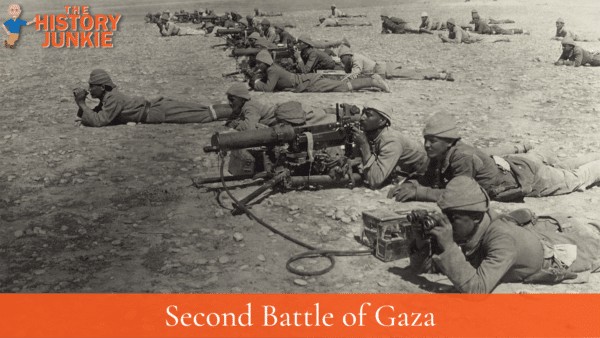After failing to capture Gaza in his first attempt on March 26-27, 1917, Sir Archibald Murray, commander of British-led forces in the region, led forces in the Second Battle of Gaza. This was because he had reported the First Battle of Gaza as a victory, even though it was actually a draw.

Overview
Murray reported the first battle as a clear-cut British victory, even though it was actually a draw. He accurately reported British casualties of 4,000, but he tripled the number of Turkish casualties, which were actually lower at 2,400.
London, under the mistaken impression that Murray was on the verge of a breakthrough, ordered him to attack again, this time with the goal of capturing Jerusalem.
This was a tall order, as the commander of Gaza's permanent garrison, German General Kress von Kressenstein, was now aware of British intentions.
The British had come very close to catching Kressenstein's forces by surprise during the first attack, but they were saved from defeat by a serious mistake made by Murray's subordinate commander, Sir Charles Dobell.
The Battle
The battle was renewed on April 17, 1917. In the meantime, the Turks had extended their formidable garrison defenses southeast along the road to Beersheba.
Dobell chose to launch a frontal assault on Kressenstein's force of 18,000 with three British infantry divisions, aided by eight heavy Mark I tanks and 4,000 gas shells.
However, the British were unable to make any significant gains despite having a two-to-one manpower advantage. This was due to the complex and effective Turkish defensive lines.
Dobell called off the attack on the third day after it became clear that it was a failure. The British suffered heavy casualties, with 6,444 men killed or wounded. Turkish losses were much lower, at just over 2,000 men.
British Fallout
In the aftermath of the British defeat, Kressenstein wanted to launch a counter-attack against Murray, but his more cautious commander, Djemal Pasha, overruled him.
After the British defeat, Kressenstein wanted to launch a counter-attack against Murray, but his more cautious commander, Djemal Pasha, overruled him.
Murray, aware that the British government would be displeased with the failure of the attack, relieved Dobell of command and replaced him with cavalry General Chetwode.
However, the British government was so shocked by the defeat that they decided to purge the high command, and Murray was recalled to London.
Sir Edmund Allenby was sent to replace Murray. Allenby was another British general whose star appeared to be on the wane. He correctly regarded his redeployment from the Western Front to Palestine as a sign of failure, as he was never on good terms with BEF Commander-in-Chief Sir Douglas Haig.
However, Allenby went on to engineer a spectacular revival of his and his army's fortunes in a series of comprehensive British victories in Palestine.
